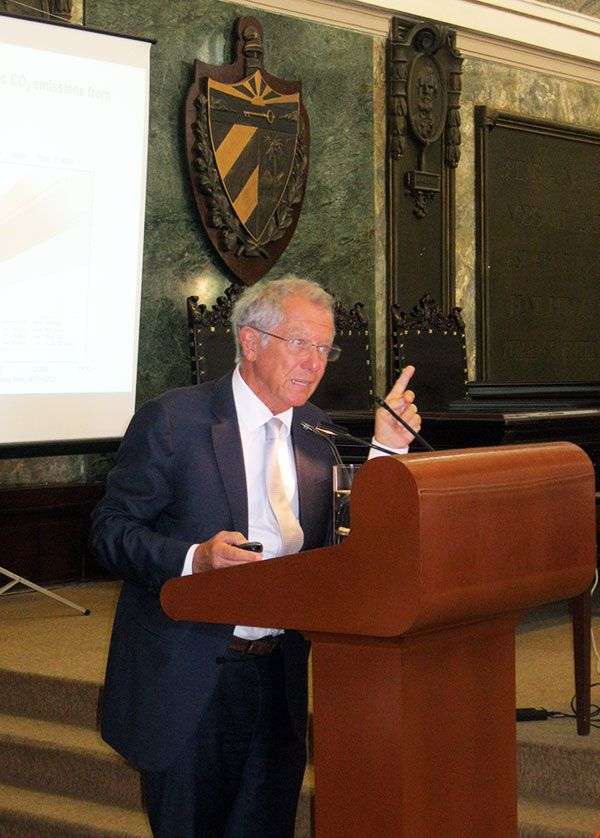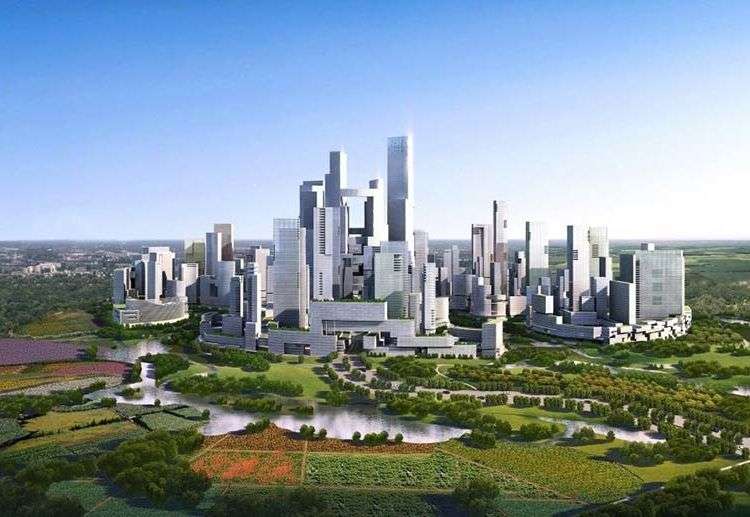An English knight visited Havana to discuss aircrafts powered by the sun, plastic electric cars and buildings with roofs that produce energy. His name is Sir David King and has the responsibility to be the Special Representative for Climate Change of the British Foreign Ministry.
His solid study on the issue of the challenges planet Earth and humanity are facing was sufficient for his to deliver the conference “Smart Cities of the Future” at the Aula Magna of the University of Havana. His arguments showed a holistic approach to the issue and maintained the view “not concentrate on one problem at a time,” as they warned of the urgency of action to combat the effects of climate change.
Sir David was Chief Scientific Adviser to the British Government and Director of the Government Office of Science from 2000 until 2007 for his work with the climate and energy challenge was knighted in 2003 and made an Officer of the French Legion of Honor in 2009. Despite his busy schedule on the island, he took some minutes to give an exclusive interview to OnCuba.
It is your first visit to our country, why did you come to Cuba this time?

The first of October last year I started working on this post. So in 12 months I have visited 31 countries. I had always wanted to come to Cuba, because I think we have much in common. Great Britain is an island, and as Cuba faces to the impacts of climate change. My job is to hold bilateral meetings on the subject, because my country believes that this is the way of working together, not leave it to trading on large gatherings with thousands of representatives of other organizations. My role is to eliminate misunderstandings and encourage work and cooperation. Right now I chair, for example, the Future Cities Catapult organization and also represent the Apollo Global Program. For the realization of these projects we hope to raise 10 billion if countries contribute 0.02 of its GDP annually within a decade. This fund would allow us to solve various global initiatives, primarily relating to the issue of energy assurance. It is a way of promoting the sustainable development of our countries.
How would the cities of the future be? What would it take to build them or transform them and how long will it take them to exist?
You’ll be very disappointed in my answer, because we do not know how they will be. We are creating a global clearinghouse for working with experts throughout the world and find the answer to that question, because every city, town and region has different challenges, different stories. So we are creating not so much a solution as a methodology, a tool to reach the cities of the future.
The fundamental problem for the cities of the future will focus on the procurement, storage and distribution of “clean” and sustainable energies, as you said in your lecture, but some critics argue that there is no technology that is completely friendly to the environment, what is your view on this?
Let’s define what we mean by “clean” energy: zero emissions of carbon dioxide and zero atmosphere deteriorating. Those are the two essential conditions. Regulations on “clean” energy are very strict and refer to having zero impact on the environment and ecology. We can also speak of an aesthetic impact on around us. These are very important issues when it comes to searching for “clean”, safe, attractive and make proper soil management energies.
In Iceland, for example, geothermal sources can be attractive places for obtaining energy. This way is very friendly to the environment. But many parts of the world have this mechanism of energy. So it is with wind, solar and other, because every place has its own special features that allow you to use one or another source of renewable energy. Solar energy requires large tracts of land to be used, but I am against spending fertile land for the placement of panels. One solution might be to place them in roofs of houses, as in several countries, and use the space to generate power. It is a challenge for the spatial problem. But if a country like India, which has large deserts and tracts of land not used in agriculture, the installation of this technology could provide it with all the energy you need. The geographic theme is therefore essential.
Other people argue as negative the high cost of renewable energy production…
Initially one watt produced with solar energy technology cost $ 75; today costs just a dollar and the trend is to go down, like wind power. The most important lesson I try to illustrate refers to the learning curve. Costs are reduced the more the learning curve increases. Many economists ignore this curve. The price will continue to decline, because more people will know of its benefits. So the Apollo program is so important, to get to the point in 2025 where it will be cheaper to produce energy from renewable and alternative methods than using hydrocarbons, to which the security of energy supply is added, which shall not be imported, the health and welfare of the people from zero harm to the environment and of course, this would mean confronting climate change.
Many countries, such as France, generate almost all of its energy from nuclear techniques, how nuclear energy would be located in this context? Could it coexist with renewable energy?
Yes, of course. Countries in northern Europe would mostly depend on obtaining energy from nuclear techniques. This part of Europe is densely populated; however, across the Mediterranean is the Sahara desert, which is a great resource for solar energy. So smart grids can be installed in the boot of Italy and from there spread to the rest of Europe. It is a possibility that is also discussed.
Recently, Cuban Foreign Minister Bruno Rodriguez Parrilla and some Latin American presidents stated in the UN Climate Summit that the only chance of saving the planet is the radical transformation of consumer habits generated by capitalism, then what would be the political system and socioeconomic would accompany future cities?
The economic model of the capitalist world of the twentieth century is not a model that serves the purposes of the XXI century. That’s a model whereby goods are produced for the market and from the depreciated life became waste. Under this model the world found a mechanism to give value to the atmosphere, the environment and the ecosystems that share the great human family. That capitalism is known as “market failure”, they have to adapt. But we have not been successful in many of these challenges. Yes we have been successful in generating acid rain pollution in cities by automobiles. Many of these practices are banned today, and there have been regulations, standards, to improve these challenges within capitalism. But generally we have failed. And honestly, I do not think any currently existing system is ready to meet these challenges, and has not been able to solve them. Then we need a new form of organization, administration, a new way of economic and social thinking. There is a huge debate on this subject.
But would this new manner based on patterns of moderate consumerism?
It has to be based on assessing human welfare above all with preserving ecosystems that provide us with what we need to live. Any economic system has to have those two things in mind, not over demand or over offer. So far dominates the linear economy where there is production, consumption and waste. In a circular economy the whole system would be designed so that after finishing the life of the product you can return to the production line and serve as raw material for other products. Do not discard anything reusable.
We spent decades looking at countries discussing climate change, without reaching concrete agreements to curb environmental degradation, what do you think will happen in the next meetings of Lima, in December, and Paris in 2015?
There will be an agreement in Paris and will not be a second Copenhagen. The meeting Ban Ki-Moon called last week at the UN was the largest gathering of heads of state on any issue that the world has ever seen and that’s a good sign. Whenever the United States representative intervened meant they were talking about this issue with their Chinese counterparts. The main failure of Copenhagen was that China and the United States could not agree. There will be an agreement this time. But will this agreement be strong enough? Not immediately. It is an agreement that allows a mechanism for constant reevaluation, but our work does not end in Paris.










